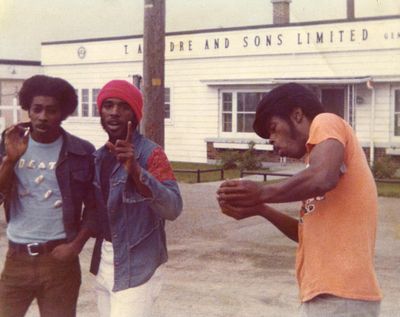Brotherly bond at heart of pioneering band

When they recorded their only full-length album in 1974, the three members of the Detroit band Death couldn’t have possibly anticipated the bizarre turns their careers would eventually take.
They were an anomaly in their time – three African-American brothers playing punk rock in the birthplace of Motown, and doing it years before bands like the Sex Pistols and the Ramones brought the genre greater popularity. The group almost secured a record deal with producer Clive Davis, but it fell through when they refused to change their name, which was then deemed too controversial for a mainstream label. The band broke up shortly thereafter.
The master tapes of the Death album, titled “…For the Whole World to See,” collected dust in an attic for years, while the legend of the band and rumors of the record’s existence circulated among collectors and in online forums.
“A Band Called Death,” a documentary directed by Jeff Howlett and Mark Covino, recounts the band’s origins and continues into the present, as Death’s music is rediscovered and celebrated by modern rock critics. Death didn’t invent punk, nor did they perfect or redefine it, but their refusal to conform to the expectations of what kinds of music black artists should be making is immensely important. Surrounded by the influence of the Jackson 5 and the Commodores, Death instead worshipped The Who, Alice Cooper and their Detroit kin MC5.
Death’s only members were the Hackney brothers – Bobby, Dannis and the late David – who were inspired to pick up instruments after seeing the Beatles on “The Ed Sullivan Show.” Their mother, who had recently lost her husband in a car accident, encouraged her sons to pursue their musical aspirations, turning an upstairs bedroom into a makeshift rehearsal space.
In interviews with Bobby and Dannis, it becomes clear that David was the driving force behind the style, sound and ethos of Death. Eccentric, artistic and intensely spiritual, David wrote the band’s music to reflect his philosophy that death was “the ultimate high” – while music executives considered Death a morbid name, David saw it as a transcendental one. He died in 2000 of lung cancer.
“…For the Whole World to See” was finally mastered and released in 2009, and the surviving members of Death went on tour with music they hadn’t played in 35 years. Bobby and Dannis, who formed a reggae jam band following Death’s demise, credit Death’s newfound recognition to David: Before he died, he remarked that “one day, someone’s going to come looking for these tapes.”
“A Band Called Death” has the misfortune of being released right on the heels of last year’s Oscar-winning documentary “Searching for Sugar Man,” which also chronicled the reappraisal of an unsung musical icon from Detroit. “Sugar Man” is certainly the more polished and meditative film, but “A Band Called Death” packs as much of an emotional punch, and its final half hour is sincere, candid and surprisingly moving. It’s a deeply poignant family portrait, a moving love letter to a deceased brother, and a monument to a band that deserves to be heard.